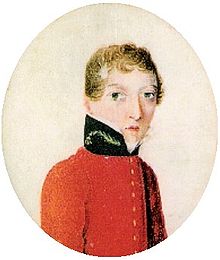Fifty years before the Edinburgh Seven, in the early nineteenth century a young student from Cork, Ireland, entered the Medical School at the University of Edinburgh. Matriculating barely in their teens, James Barry was a child prodigy who was to graduate and qualify as a doctor a mere three years later in 1812, after a gruelling two-hour viva in Latin and Greek.
Barry was a flamboyant figure, slight and slender, who loved bright colours and beautiful fabrics and was an inveterate flirt. But underneath the peacock figure lurked a dark and dangerous secret.
Dr Barry was a woman.
On the hunt for an interesting subject for a biographical play, I came across the story of James Barry and was instantly hooked. I was looking for a compelling character, preferably not too familiar to most people, someone whose story begged to be told. Who better than someone who had achieved extraordinary things, saved countless lives, transformed history even, but who had been virtually airbrushed from the record? Thus A Singular Deception was born.
Over the course of her career, Dr James Barry would go on to revolutionise the treatment of many illnesses, completely overhauling many medical practices of the day and was the first European to perform a Caesarean section where both mother and child survived.
Whatever the circumstances of the initial subterfuge which allowed her to study medicine at a time when women were barred from undertaking an education at university, Barry continued to masquerade as a man in the British Army for nearly 50 years in order to practise medicine and rose to the highest medical rank, Inspector General of Hospitals. It might have been expected that, to maintain her secret, she would keep a low profile and shun publicity. But that was not her style. She was outspoken, suffered fools not at all and seems to have positively delighted in provoking arguments and courting controversy. Despite her tiny stature, she fought two duels. And won both of them, needless to say. Throughout her life, she was hiding in plain sight.
But none of this would have been possible without the assistance of Barry’s lifelong manservant, Black John, possibly from Jamaica, who travelled the world at her side. He it was who guarded the doctor’s secret, protected her from prying eyes and dealt with her personal needs. No-one but he was allowed in her bedchamber.
During the doctor’s long service career, the pair travelled extensively: South Africa, Mauritius, St Helena, Malta, Corfu, Jamaica, Canada, even venturing to the Crimea (without permission) to inspect – and criticise – Florence Nightingale’s nursing practices. The doctor did not make a good impression on the redoubtable nurse who recorded afterwards: ‘The brute! The brute! That is the most hardened creature I ever met throughout the army!’
James Barry was the first woman to qualify as a doctor in the British Isles, long before Elizabeth Garrett Anderson who obtained a license to practise medicine in 1865. A social and medical reformer, Barry transformed the treatment of sexual diseases, leprosy and mental illness, often developing her own medicines. She brought about extensive changes to public health within the Army, saving hundreds if not thousands of lives in time; many of her innovations remain in place to this day. Irascible with those she thought incompetent, she was nevertheless ahead of her time as regards gender and racial equality and was the soul of kindness and generosity to the sick, the dispossessed and the oppressed.
Her end was not happy. She was discharged from the Army on the grounds of ill-health, despite mounting a vigorous defence in front of the Medical Board, only months before she could have retired on a full pension. Penniless and sick, she and faithful John returned to London, where she died in 1865, to be buried in an obscure grave in Kensal Green Cemetery after the Army finally discovered her true identity. The woman employed to lay out the body ignored Black John’s express instructions and unwrapped the corpse, to reveal Barry’s secret – and the fact that she had borne a child. Despite the Army’s best efforts, the woman made sure the secret was made public. Humiliated and outraged, the Army sealed all Dr Barry’s records for 100 years.
The personal cost of this secret life is exemplified by the discovery, after Barry’s death, of a trunk containing many pictures of ladies’ dresses and accessories, cut from magazines.
The more I discovered about Dr Barry, the more I admired her. I believe this hugely talented woman, constantly fighting prejudices and the patriarchy, always aided and supported by her shadowy Black servant, still speaks to us today. Her constant fights, not only with the establishment, but also her own temperament and physicality, make her achievements all the more astonishing. It is shameful that she has been virtually airbrushed from history. It has been my privilege and joy to bring her story to life.
A Singular Deception, the remarkable true story of Dr James Barry, will receive its world premiere at the Edinburgh Festival Fringe 2024, presented by EGTG at The Royal Scots Club (Venue 241) 19:00 05-10 August.






